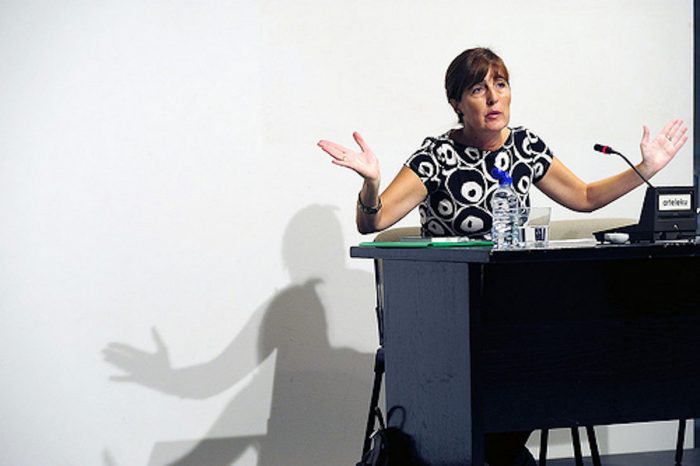In the Labyrinth of Listening: between eco-nomy and eco-logy
Carmen Pardo
_
Tuesday, 25th October
Time: 18:30 h.
Place: Kaxilda
Entrance: Free (while seats remain)
_
Legend has it that after killing the Minotaur, Theseus was able to leave the labyrinth thanks to the thread with Ariadne gave him. In the labyrinth of listening, on the other hand, multiple threads are needed and, inevitably, they lead us to an incalculable number of possible conclusions. Each exit matches a type of listening. However, in this talk we are going to examine how to inhabit the labyrinth of listening, not how to leave it. To do so, we will look at how eco-nomy and eco-logy create tension in our sonic, social and mental landscape. Perhaps in this tension it will be possible to invent other ways of inhabiting a labyrinth of listening, which is also the social and mental maze which we have all around us.
_

_
Lecturer at the University of Girona and in Sonic Art at the University of Barcelona. Post-doctoral researcher at IRCAM-CNRS, Paris (1996-1998), where she carried out investigation into sonic space in contemporary music. She edited and translated John Cage, Escritos al oído (1999), is the author of En el silencio de la cultura [‘The Silence of Culture’] (2016); La escucha oblicua: una invitación a John Cage [‘Oblique Listening: an Invitation to John Cage’] (2001; 2014, French translation Approche de John Cage. L’écoute oblique, 2007, awarded the Coup de cœur prize in 2008 by the Académie Charles Cross); Robert Wilson (in collaboration with Miguel Morey, 2003, Spanish and English versions); Las TIC: una reflexión filosófica [‘ICT: a Philosophical Reflection’] (2009); En el mar de John Cage [‘In John Cage’s Sea’] (2009). She has collaborated to collective works such as Présences de Iannis Xenakis/ Presences of Iannis Xenakis, (2001); Music, Arts, Technologies. Toward a critical approach, (2004); La parole sur scène. Voix, texte, signifié [‘The Word on Stage: Voice, Text, Meaning’] (2008), Encuentros de Pamplona 1972: Fin de fiesta del arte experimental [‘The Pamplona Meetings 1972: Experimental Art’s Final Party’], (2009); desbordamiento de VAL DEL OMAR, [‘The Overflowing of the VAL DEL OMAR’] (2010); Elena Asins. Fragmentos de la memoria [‘Fragments of Memory’] (2011); Théories de la composition musicale au XXe siècle [’20th Century Musical Composition Theory’], (2013); Art i decreixenent/Arte y decrecimiento/Art et décroissance [‘Art and degrowth’] (2016); She has organised and coordinated various international meetings such as Músicas, artes y tecnologías: por una aproximación crítica [‘Music, Arts and Technology: towards a Critical Approach’], (Barcelona/Montpellier, 2000); el espectáculo art media Bosque Sonoro : Homenaje a John Cage [‘The Media Art Show: Homage to John Cage’] (Barcelona, 2003); Música en la noche [‘Music in the Night’]; La Música de la Arquitectura: Varèse, Xenakis, Dusapin [‘The Music of Architecture’] (collaboration in Músicadhoy/La Casa Encendida, Madrid, 2009, 2010); Night of the Electroacoustic Music; El sonido en la cueva (Sorderas) y Sonidos del poder. Escuchas del miedo [‘The Sound of the Cave (Deafnesses) and Sounds of Power. Listening with Fear’] (en collaboration with the Orquestra del Caos, Bruselas 2008 y Barcelona, 2008 y 2009); Musique et Écologies du son [‘Music and Ecologies of Sound’] (Paris, 2012), Música, Sociedad y Procesos de subjetivación [‘Music, Society and Processes of Subjectivity’] (Girona, 2015), and she was co-commissioner at the exhibition Encuentros de Pamplona 1972: Fin de fiesta del arte experimental (MNCARS, 2009-2010).
